A) I
B) II
C) III
D) IV
F) A) and C)
Correct Answer

verified
Correct Answer
verified
Multiple Choice
Predict the major product of the following reaction. 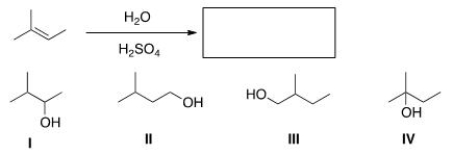
A) I
B) II
C) III
D) IV
F) All of the above
Correct Answer

verified
Correct Answer
verified
Multiple Choice
Which of the following compounds has the highest boiling point?

A) I
B) II
C) III
D) IV
F) B) and C)
Correct Answer

verified
Correct Answer
verified
Multiple Choice
Which of the following statements about alkenes is not true?
A) They are less reactive than alkanes.
B) They can exist as cis/trans isomers.
C) The bond angle around the C-C double bond is approximately 120°.
D) The carbon of the C-C double bond is sp2 hybridized.
F) None of the above
Correct Answer

verified
Correct Answer
verified
Multiple Choice
Which of the following reactions of alkenes takes place with anti stereochemistry only?
A) Addition of HBr
B) Addition of H2O in the presence of H2SO4
C) Addition of BH3 followed by H2O2/HO-
D) Addition of Br2
F) A) and C)
Correct Answer

verified
Correct Answer
verified
Multiple Choice
Predict the product(s) of the following reaction. 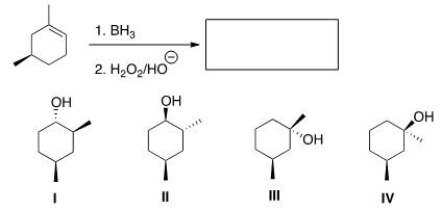
A) Only I and II
B) Only I and III
C) Only II and III
D) Only III and IV
F) B) and C)
Correct Answer

verified
A
Correct Answer
verified
Multiple Choice
Predict the major product(s) of the following reaction. 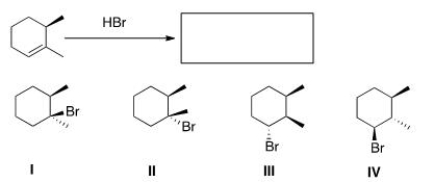
A) Only I and II
B) Only II and III
C) Only III and IV
D) Only I and IV
F) A) and C)
Correct Answer

verified
Correct Answer
verified
Multiple Choice
Which of the following alkenes will undergo a carbocation rearrangement when reacting with H2O in the presence of a small amount of H2SO4?

A) Only I and II
B) Only I and III
C) Only II and III
D) I, II, and III
F) A) and D)
Correct Answer

verified
Correct Answer
verified
Multiple Choice
Predict the product of the following reaction, ignoring stereochemistry. 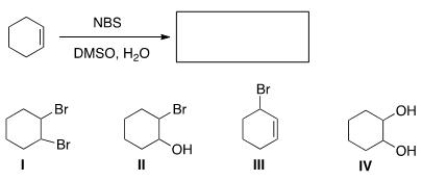
A) I
B) II
C) III
D) IV
F) B) and D)
Correct Answer

verified
Correct Answer
verified
Multiple Choice
Predict the major product(s) of the following reaction. 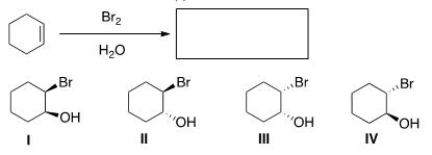
A) Only I and II
B) Only II and IV
C) Only II and III
D) Only I and IV
F) C) and D)
Correct Answer

verified
Correct Answer
verified
Multiple Choice
What is the best choice of reagent to accomplish the following transformation?
![What is the best choice of reagent to accomplish the following transformation? A) H<sub>2</sub>O, Br<sub>2</sub> B) [1] BH<sub>3</sub>; [2] H<sub>2</sub>O<sub>2</sub>/HO<sup>-</sup> C) H<sub>2</sub>O, H<sub>2</sub>SO<sub>4</sub> D) [1] BH<sub>3</sub>; [2] H<sub>2</sub>O](https://d2lvgg3v3hfg70.cloudfront.net/TB5872/11eb4ad7_6c29_6bd1_99b2_6dfb64ad1510_TB5872_00.jpg)
A) H2O, Br2
B) [1] BH3; [2] H2O2/HO-
C) H2O, H2SO4
D) [1] BH3; [2] H2O
F) All of the above
Correct Answer

verified
Correct Answer
verified
Multiple Choice
Which of the following alkenes reacts fastest with HCl?

A) I
B) II
C) III
D) IV
F) A) and C)
Correct Answer

verified
D
Correct Answer
verified
Multiple Choice
Rank the following isomers in order of increasing boiling point, putting the least first. 
A) I < II < III
B) I < III < II
C) II < III < I
D) II < I < III
F) B) and D)
Correct Answer

verified
Correct Answer
verified
Multiple Choice
What is the major product of the following reaction?
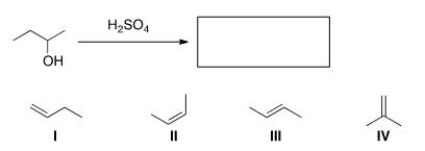
A) I
B) II
C) III
D) IV
F) None of the above
Correct Answer

verified
C
Correct Answer
verified
Multiple Choice
What is (are) the missing reagent(s) in the following reaction?
![What is (are) the missing reagent(s) in the following reaction? A) Br<sub>2</sub>/CCl<sub>4</sub> B) NBS, DMSO/H<sub>2</sub>O C) [1] Br<sub>2</sub>; [2] H<sub>2</sub>O D) [1] BH<sub>3</sub>; [2] H<sub>2</sub>O<sub>2</sub>/HO<sup>-</sup>](https://d2lvgg3v3hfg70.cloudfront.net/TB5872/11eb4ad7_6c29_e105_99b2_e74e1c01433d_TB5872_00.jpg)
A) Br2/CCl4
B) NBS, DMSO/H2O
C) [1] Br2; [2] H2O
D) [1] BH3; [2] H2O2/HO-
F) All of the above
Correct Answer

verified
Correct Answer
verified
Multiple Choice
What is the major product obtained from the following reaction (assume enantiomer is also formed) ?
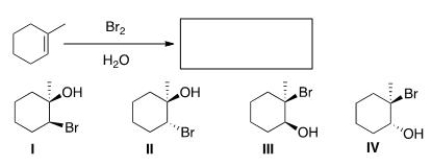
A) I
B) II
C) III
D) IV
F) None of the above
Correct Answer

verified
Correct Answer
verified
Multiple Choice
Which of the following is a terpene?
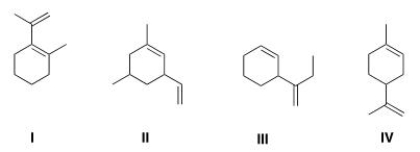
A) I
B) II
C) III
D) IV
F) B) and D)
Correct Answer

verified
Correct Answer
verified
Multiple Choice
Which of the following statements about the stereochemistry of electrophilic addition of HX to alkenes is true?
A) Achiral starting materials yield an unequal mixture of two enantiomers.
B) Hydrohalogenation occurs with syn stereochemistry only.
C) Hydrohalogenation occurs with anti stereochemistry only.
D) Hydrohalogenation occurs with syn and anti addition of HX.
F) A) and C)
Correct Answer

verified
Correct Answer
verified
Multiple Choice
What type of reactive intermediate is formed in the reaction of an alkene with Br2 and H2O to give a bromohydrin?
A) Carbanion
B) Radical
C) Carbocation
D) Cyclic bromonium ion
F) None of the above
Correct Answer

verified
Correct Answer
verified
Multiple Choice
Which of the following alkenes are terminal alkenes?

A) I and II
B) II and III
C) I and IV
D) I and III
F) All of the above
Correct Answer

verified
Correct Answer
verified
Showing 1 - 20 of 43
Related Exams